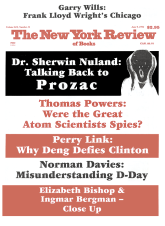In response to:
A Dissent on 'Schindler's List' from the April 21, 1994 issue
To the Editors:
Jason Epstein in his criticism tears Schindler’s List to pieces [NYR, April 21]. He complains that Spielberg concentrates on “an atypical good deed” instead of reflecting on the dimension of the evil in mankind; in other words he criticizes Spielberg for having made this instead of another film.
It is years since I have seen a film of such importance. It could in this age of ours with its ever increasing brutality—where violence is seen as an everyday normal occurrence—help to shake people up. Its shock effect is surprising and overpowering. Since the release of the film in Germany in early March until the beginning of May, i.e., in two months, four million, mainly schoolchildren and young people—often whole school classes—have seen it. Whereas normally at performances for schools, the young audience is rowdy, there is chattering and joking, in Spielberg’s film hundreds of schoolchildren sit still, deeply moved. All reports mention that “you could hear a pin drop.”
The Spiegel writes: “Schindler’s story is all the more credible because it is told by the creator of ‘E.T.’ and ‘Jurassic Park’ and not issued by the Federal Institute for Political Instruction.” Only neo-Nazis avoid seeing the film. “Nobody in our circles shows any great interest in it,” says the head ideologist of the Hamburg Nationalist Party.
For me the film opened up a completely new aspect. As a young person and politically committed, I experienced the Hitler time on the opposing side, and consequently knew that these people were inhuman criminals. In Schindler’s List, however, it became clear to me that they were not so much “inhuman” as “ahuman.” They were not human beings, but what we see acting in the film are strange creatures or mechanical robots of violence.
Maybe this could also be the reason why the young people are so deeply affected. In the case of individual acts of violence, one can still feel oneself a hero—but how in a system of collective violence?
Mr. Epstein queries whether the film is meant to prove that if there had been more Schindlers, the Holocaust would have been prevented. No, this was quite certainly not the intention. Schindler, being hero and anti-hero in one and the same person, and thereby totally unique, thus becomes exemplary.
What further makes the film so convincing for the younger generation is that there is no obvious historical, philosophical intent but that the viewers are quite simply confronted with the monstrosity—it simply pounces on them. And in its wake the delight in violence, meant as provocation, fades away.
Marion Dönhoff
Die Zeit
Hamburg, Germany
This Issue
June 9, 1994



